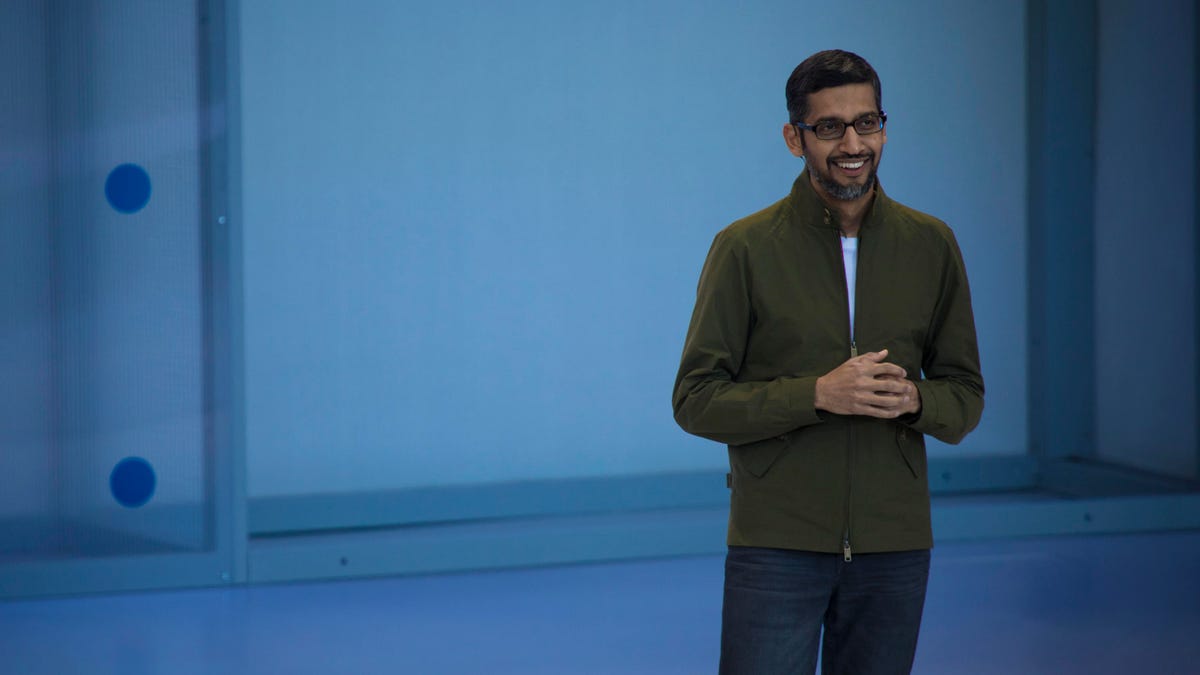Google 'not close' to launching search engine in China, Pichai says
About 1,000 employees protested the alleged development of a search engine that would give censorship powers to the Chinese government.

Google CEO Sundar Pichai says the company isn't close to launching a search product in China.
Google CEO Sundar Pichai on Thursday tried to assuage concerns among Google employees about reports the company is trying to re-enter the Chinese market.
Pichai said the internet giant is "not close to launching a search product in China" but is thinking about how to do more in the country, according to the Wall Street Journal.
Pichai's comments came during a weekly all-hands employee meeting at Google's Mountain View, California, headquarters. They were apparently aimed at addressing reports the company is developing a new search engine and mobile news app that would allow the Chinese government to censor search results for its citizens.
The alleged secret project, reportedly codenamed Dragonfly, led to a protest by more than 1,000 Google employees who objected to their working toward supporting state-sponsored censorship. The employees signed an open letter asking for the company to be transparent about the project and to create an ethical review process for it that includes rank-and-file employees, not just high-level executives.
The letter had been circulating on Google's internal information systems, according to a Google employee who asked not to be identified because the employee wasn't authorized to speak publicly about internal matters. The New York Times earlier Thursday reported news of the letter.
"Our industry has entered a new era of ethical responsibility: the choices we make matter on a global scale," the letter said. "Yet most of us only learned about project Dragonfly through news reports in early August."
Google declined to comment for this story.
A changing environment
The protest illustrates a shifting cultural environment at Google, where employees have been more outspoken, publicly challenging strategy set by the company's leadership.
It's the second time in recent months Google employees organized to protest one of the company's projects. Earlier this year, thousands protested Project Maven, a drone initiative for the US government that could weaponize their AI research. Some employees reportedly quit over the project.
Shortly after the protest over Maven, Google said it would not renew the contract or pursue similar military contracts. Pichai also released a set of ethical guidelines for Google to follow as it continues to develop artificial intelligence. Among the guidelines: Google won't create AI for weapons, but it will still work with the military.
On Thursday, Google employees said those AI guidelines aren't enough.
"That the decision to build Dragonfly was made in secret, and progressed even with the AI Principles in place, makes clear that the Principles alone are not enough," the letter said. "We urgently need more transparency, a seat at the table, and a commitment to clear and open processes."
Uproar over China
Google left China eight years ago after similar concerns about censorship. At the time, Google co-founder Sergey Brin, who grew up in the Soviet Union, called out the "totalitarianism" of Chinese policies. (Brin reportedly also addressed staff at the meeting on Thursday.)
Some Google employees applauded the decision to leave China. "Even though it wasn't talked about, it was held up as a time Google made a decision that was very principled," said one former Google employee, in an interview. He asked not to be identified because he feared retribution from his former employer.
But reports that the company is slowly trying to push back into the Chinese market have ignited a backlash among some employees.
On Thursday, Pichai seemed to be trying to address anxieties by Google employees, but also signal a way forward.
"Our stated mission is to organize the world's information," Pichai said at the meeting, according to the Journal. "I think if we were to do our mission well, I think we have to think seriously about how we do more in China."
First published Aug. 16 at 7:23 p.m. PT.
Updated Aug. 17 at 9:12 a.m. PT: Adds information throughout.
Crowd Control: A crowdsourced science fiction novel written by CNET readers.
Solving for XX: The tech industry seeks to overcome outdated ideas about "women in tech."



